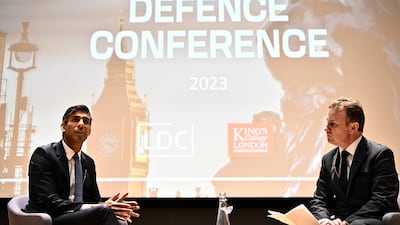Rishi Sunak has brushed off suggestions that the UK's worldwide reputation has suffered repeated damage in the political chaos that brought down three prime ministers since the 2016 Brexit vote to leave the EU.
The Prime Minister, who came to power in September, said his period at the helm had produced a series of international agreements that showed the country held an ability to work across Europe, the US and Indo-Pacific.
Appearing at the London Defence Conference at King's College on Tuesday, Mr Sunak said a new deal over Northern Ireland with Brussels and entry into the Pacific trade agreement (CPTPP) delivered benefits for British voters.
“What have we achieved in the last six months? The Windsor Framework; a new deal with the French and a summit, the likes of which we haven’t seen for years; a new deal with Albania to strengthen our ability to deal with illegal migration," he told the two-day meeting of defence and security experts.
“We’ve got CPTPP, the first European nation to accede, the GCAP [Global Combat Air Programme] for the next generation of fighter aircraft with Italy and Japan. We’ve got the Japanese defence deal that we’ve just signed."
Former prime ministers Theresa May, Boris Johnson and Liz Truss largely struggled to make headway in talks with foreign leaders, with only the Aukus submarine deal with Washington and Canberra as a standout achievement of Mr Johnson's Covid-blighted period in power.
“We’ve got Aukus – an incredible, unprecedented defence partnership with Australia and the US," Mr Sunak said. "We’ve got our leadership on China and, probably most importantly, on Ukraine, not just with hard support but also by leading the conversation from an intellectual perspective about the right way to try to resolve this conflict and make sure that Ukraine is successful.
“That’s what we’ve just done in six months ... operating in the Atlantic, in Europe, in the Pacific, delivering benefits for people at home, whether it’s tackling illegal migration, creating jobs, growing businesses.
“I don’t know how you look at any of that and say Britain is not anything but confident, free and doing great stuff that’s making an enormous difference in the world.”
Mr Sunak spoke of his admiration for the Ukrainian efforts to defend the country from the Russian invasion and predicted a forthcoming counteroffensive would produce results for Kyiv. "Their bravery, their resilience is something we can all admire and be inspired by," he said. "I think they have every chance of success because we've worked hard with them to develop a plan that we think can make a difference.
"They're in a very strong position."
Mr Sunak reaffirmed his commitment to increase defence spending to 2.5 per cent of Britain's gross domestic product (GDP) when economic and fiscal conditions allow, saying the UK was one of a “minuscule” number of countries that had consistently met the Nato standard of spending 2 per cent of GDP on defence. He would not be drawn on the best use of those resources, saying those choices lay with armed forces chiefs.
"Ultimately my job is not to second-guess the decision that our military chiefs are making," he said. "What I can say, what we’ve delivered as a government, is record defence uplifts."
Vadym Prystaiko, Ukrainian ambassador to the UK, said a Nato meeting in July must move to grant Ukraine membership of the alliance, going beyond the pathway set out in Bucharest in 2008 when it was widely agreed that Georgia and Ukraine would eventually become members.


